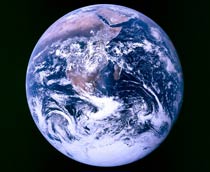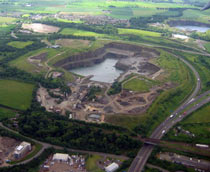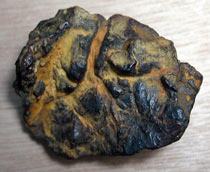
Ask the AI Tutor
Need help with Chemistry and its Importance to us? Ask our AI Tutor!
AI Tutor - Lucy
Connecting with Tutor...
Please wait while we establish connection

From cooking to painting, from making footballs to flying jets, knowledge of chemistry is useful to help us in our everyday lives.
Chemistry and its Importance to us
Chemistry shapes daily life, from medicines and materials to clean water and fuels. This GCSE quiz explores why chemical knowledge matters and where you meet it every day.
Click on any picture in the quiz to see a larger image
1 .
As the population of the planet increases, so we are faced with many problems. One such problem is what to do with the waste we produce. One solution is shown in the picture - incineration. What would be the main argument against incineration?
Destroys habitats for local wildlife
Releases greenhouse gases
Provides jobs for local people
Increases the amount of litter
Burning waste releases greenhouse gases, but could also release toxic materials into the atmosphere
2 .
The ozone layer is a layer of ozone (O3) that surrounds our planet. This ozone protects us from the harmful UV rays from the sun. How have we damaged this layer?
Recycling plastics
Releasing CFCs into the atmosphere
Burning fossil fuels
Burning plastics
CFCs used to be present in aerosols and fridges, however these are no longer allowed and the damage is stopping
3 .
Burning fossil fuels has led to a phenomenon called the greenhouse effect. Which of the following is NOT caused by the greenhouse effect?
Increase in skin cancer
Loss of habitat
Melting of the polar ice caps
Global warming
Increases in skin cancers are due to the depletion of the ozone layer which allows more harmful UV radiation to reach the Earth's surface and NOT the greenhouse effect - be careful not to get the two mixed up, they are very different and unrelated issues
4 .
Extracting metals from their ores usually involves removing the ore from the ground, often in quarries. Which of the following is an advantage of quarries?
Provides jobs to the local community
Increase in traffic in the local community
Destroy habitats of indigenous wildlife
Cause noise and dust for the local community
It can also provide improved transport links with the community
5 .
Titanium is currently experiencing a huge increase in value. Which of the following will NOT be an impact of the rising cost of this metal?
Cost of suncream
Cost of fighter jets
Cost of electrical cable
Cost of self-cleaning glass
Copper is used to make electrical cables but titanium is used in the manufacture of the others
6 .
Metals can be extracted from their ores using displacement reactions. Why is potassium not used to remove iron from its ore?
It would not extract iron from its ore
It is too expensive
There is not enough of it
It is too reactive
Money is a huge factor when deciding which chemical method to use to perform industrial processes. Carbon is far cheaper than potassium
7 .
Ethanol can be used as a biofuel. It can be manufactured in two different ways - either from crude oil or from sugar crops. but which of the following is an advantage of using crude oil as the raw material for ethanol?
It is carbon neutral
Small amount of energy required in the manufacturing process
It is a renewable resource
The ethanol produced is pure
Ethanol has the formula C2H5OH and is an alcohol
8 .
Biofuel can be made from ethanol produced from sugar cane. Which of the following is an ethical issue about the production of biofuels?
Growers in some countries grow sugar cane for fuel rather than using the land to grow crops for food
Farmers receive an increased income
The cost of fuel is lower for the consumer
More people are employed in the production of biolfuels than traditional oil-based fuels
This can lead to food shortage and starvation, especially in developing countries
9 .
Reuse and recycle are methods which reduce the amount of plastic bags that are sent to landfill sites. Which of the following is a disadvantage of these methods?
Less landfill used, so less damage to habitats
Saves energy
Transportation to recycling depots will release carbon dioxide
Preserve natural resources
There will still be an environmental impact due to transportation. A balance between the advantages and disadvantages has to be reached
10 .
Pulling off a plaster can be nearly as painful as what you did to need the plaster in the first place. Chemists have developed polymers that react to light and become less sticky, so that pulling the plaster off is not as painful. Polymers that behave in ways like this are called...
clever materials
memory materials
smart materials
sticky materials
Smart materials include memory alloys which can be used to make frames for glasses that go back to their original shape if you are unlucky enough to sit on them!
**Unlimited Quizzes Await You! 🚀**
Hey there, quiz champ! 🌟 You've already tackled today's free questions.
Ready for more?
Ready for more?
🔓 Unlock UNLIMITED Quizzes and challenge yourself every day. But that's
not all...
not all...
🔥 As a Subscriber you can join our thrilling "Daily Streak" against other
quizzers. Try to win a coveted spot on our Hall of Fame Page.
quizzers. Try to win a coveted spot on our Hall of Fame Page.
Don't miss out! Join us now and keep the fun rolling. 🎉
**Unlimited Quizzes Await You! 🚀**
Hey there, quiz champ! 🌟 You've already tackled today's free questions. Ready for more?
🔓 Unlock UNLIMITED Quizzes and challenge yourself every day. But that's not all...
🔥 As a Subscriber you can join our thrilling "Daily Streak" against other quizzers. Try to win a coveted spot on our Hall of Fame Page.
Don't miss out! Join us now and keep the fun rolling. 🎉
















